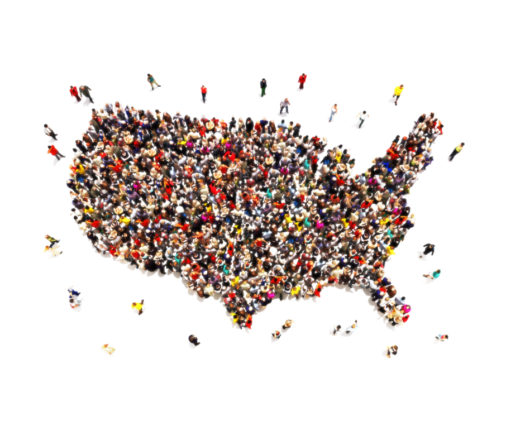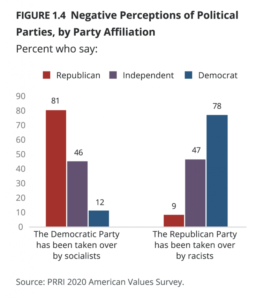
Dueling Realities: What Does the 2020 Election Mean for Toxic Partisan Polarization?
With today’s vote by the Electoral College, Joe Biden has been confirmed as the 46th President of the United States. The past few months of American politics have been controversial, marked by spin battles, disagreement, and hostility. That being said, many pre-election anxieties never came to fruition. As we headed into election week, we heard about the potential for mass violence at the polls, widespread fraud, foreign intervention, and riots in the streets. The world seemed to be teetering on the brink as we approached November 3rd, and at the end of it….we saw a largely peaceful election where both candidates turned out more votes than other candidates previously in history. We saw civic participation rise, with historic turnout from youth and voters of color, and many individuals cast their ballots for the first time even as states struggled to adjust to keeping voters safe during a pandemic.
But with dawn rising over a new day in the weeks after the election, our nation did not come together in a kumbaya moment of healing. We didn’t suddenly fix the divisions of our nation on November 3rd. The reality is we are still deeply divided.
Joe Biden will become the next President of the United States, winning both the popular vote and the Electoral College. However, President Trump still managed to gain 10 million more votes than he received in 2016. This makes President-Elect Joe Biden and President Trump the 2 largest vote getters in the history of American elections, hardly a repudiation of politics from either political party.
For liberals, the 2020 election felt like the righting of a historic wrong. Twice in the past 20 years have Democrats won the popular vote but lost the Electoral College. When Joe Biden was declared the winner by a majority of news networks, you saw people dancing in the streets. Simultaneously, liberals grieved over the fact that they expected a landslide victory thanks for flawed polling, something that never materialized. However, due to an increase in Trump voters, liberals had to come to terms with the idea that the nation they thought they knew isn’t, in fact, the reality we currently live in.
For conservatives, the 2020 election felt like it was stolen, primarily due to a narrative of election fraud regarding absentee ballots that was shared by President Trump and multiple conservative news outlets. To many, it seemed like the liberal media decided the election by declaring the results before final voters were counted, and perpetuating fraud to remove a sitting president.
A large part of how people feel about the 2020 election likely depends on what media you consume. A new study revealed that Americans are spending 215% more time consuming digital media than they were over the same period last year. On social media in particular, users are driven towards divisive content. In a 2018 presentation, Facebook noted, “Our algorithms exploit the human brain’s attraction to divisiveness. If left unchecked [it would Facebook feed users] more and more divisive content in an effort to gain user attention & increase time on the platform.”
Democrats and Republicans currently live in dueling realities. A recent study by the Public Religion Research Institute revealed that 8 in 10 Democrats believe the Republican Party has been overtaken by racists, while 8 in 10 Republicans believe the Democratic Party has been overtaken by socialists. Nearly half of all Independents surveyed agreed with both statements.

The reality is that 71 million votes can not be written off as all being racists, and 76 million cannot be written off as being all socialists. There is a nuance in the political process that is missed when affective polarization increases, or as Andrew Hanauer of One America Movement wrote recently, “The type of polarization now facing the U.S. is different, and it’s toxic. It has morphed from issues to identities, from “I don’t agree with you to “I don’t like you” to “You must be stopped.”
However, a second narrative has been making the rounds lately, and that is the idea that the country simply is not ready to come together. While it is easy to say “why can’t we all just get along?” this idea in itself has become divisive in the wake of the 2020 election.
The anger and pain that many people feel around the country is a lot deeper than just calling up a friend with different political beliefs. We have heard that asking people to reach out to those who voted for an alternative candidate is another form of toxic positivity and gaslighting from those who can afford to be apolitical. The reality is, politics impacts every level of people’s lives, especially for marginalized communities. For some, voting is an expression of an existential crisis, and by negating that people and organizations run the risk of alienating the very groups they are trying to help. And the pain people are feeling isn’t just at an emotional level. Researchers from from UC Berkeley, Stanford University, and Johns Hopkins University have found a neural basis to partisan biases
The reality is partisan polarization isn’t going to disappear after the 2020 election. Yes, research shows that the US is more polarized than any time in recent history, but a Pew Research Study released only last week makes an excellent point regarding our history of polarization,
“Before we get nostalgic for a less polarized past it’s important to remember that eras of relatively muted partisan conflict, such as the late 1950s, were also characterized by structural injustice that kept many voices – particularly those of non-White Americans – out of the political arena. Similarly, previous eras of deep division, such as the late 1960s, were far less partisan but hardly less violent or destabilizing.”
We may be a ways off from that ‘kumbaya coming together’ moment that many individuals hoped for after the election, but it isn’t all negative. 86% of Trump supporters and 89% of Biden supporters said that if their preferred candidate was elected they should focus on addressing the needs of all Americans, “even if it means disappointing some of [their] supporters.”
At Civic Health Project, we remain committed to addressing affective polarization, or the sharp rise in dislike of others with differing political beliefs. This in turn decreases American’s willingness to come together and solve problems which endangers the lives of all Americans. We do this through our 4 E’s Framework: Expose (Americans to unique ideas and perspectives), Engage (with one another across difference), Educate (Americans directly about how and why we have become so polarized), and Elevate (how we see ourselves and others beyond partisan identities).
We know not everyone is feeling the unity right now, and some may need time to heal before any attempt can be made to build or repair relationships with those who voted for another candidate. But at Civic Health Project we will continue to roll up our sleeves and help organizations who are bringing people together. The danger of not doing so and glossing over our divisions is too high, especially in the long run.
It isn’t facts and talking points that change hearts and minds, it’s relationship building. And while we don’t necessarily know what the next few years will bring politically, we do know that the organizations we work with will be on the front lines, helping people on the left and right come together and find common ground and common purpose.
